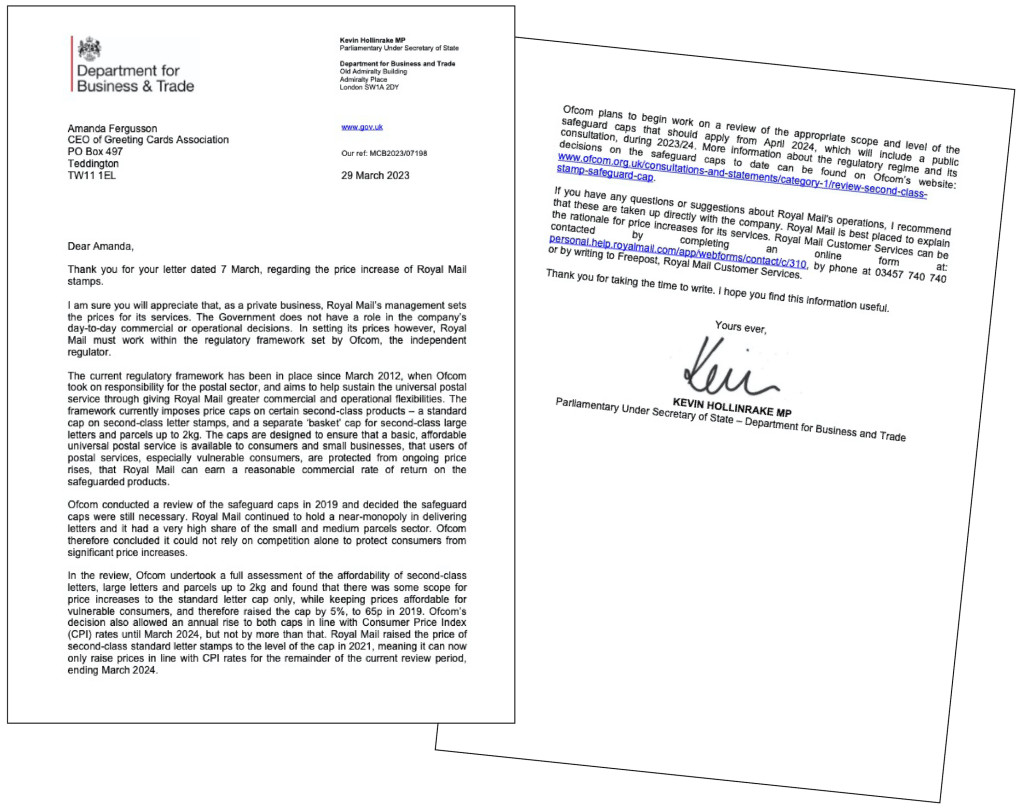Today’s Independent Retailers’ Confederation meeting will discuss escalating fears
As the GCA continues to apply pressure along with government, Ofcom, the media and MPs over Royal Mail’s escalating difficulties, its concerns have been echoed by the British Independent Retailers’ Association (BIRA).
BIRA has also taken to the media and both organisations will join forces with others at a high-level meeting of the Independent Retailers’ Confederation (IRC) meeting this morning, 4 April.
Following last week’s revelations that Royal Mail’s board has threatened to put the loss-making postal service into a form of administration if a deal cannot be agreed to end the long-running industrial dispute, GCA ceo Amanda Fergusson asked that the issue be on the IRC’s agenda.

And fellow member BIRA has issued a press release stating it fears thousands of independent businesses and hundreds of High Streets will suffer if Royal Mail does go into administration, and asked the company and Communication Workers’ Union to consider the bigger picture.
BIRA, which works with over 6,000 independent businesses of all sizes across the UK, confirmed it had been approached by a number of smaller businesses who said the Royal Mail were a lifeline to them.
The association’s ceo Andrew Goodacre said: “Should Royal Mail collapse, the knock-on effect will be devastating for thousands of retailers who are struggling already and rely on the service to either bring in footfall through their doors, or to send out goods.
“The situation at Royal Mail is very worrying to us all. Previous strikes caused severe disruption to retailers who have shops and also sell online. The possibility of administration for Royal Mail is an even greater concern as it may have even more negative impact than the strikes. We urge Royal Mail management and the unions to resolve the issues before other smaller companies suffer the consequences.”

Drawing on articles from Progressive Greetings, including retailers’ comments of how the Royal strikes impacted the sector in the run up to Christmas, Amanda will be going to the meeting well armed.
She also recently received a considered response from Kevin Hollinrake, MP and parliamentary under-secretary of state for enterprise, markets and small business, to the GCA’s letter of concern over the inflation-busting 16% increase in the price of a first-class stamp, smashing through the £1 barrier with a 15p rise to £1.10, which kicked in yesterday, 3 April.
Even the second-class price, capped by regulator Ofcom “to make sure an affordable option is always available”, is rising by over 10% from 68p to 75p – and the timing means the increase came into force the day before the first King Charles III stamps were released today.
She raised the issue with Kevin at the last IRC monthly meeting – he has committed to attend quarterly meetings with the organisation – then followed up with a letter stating: “Many of our members are suggesting it could be construed that Royal Mail are raising prices to put off consumers sending mail”, and finished with a plea: “It is against this context that many of our members are wondering if, perhaps, the regulator could have done more to safeguard the postal service and avoid this situation. We ask government to consider the benefits to the country of a more robust stance in relation to these price rises.”

However, while clearly a lot of thought had gone into the minister’s response, it also highlighted that the government cannot control all elements of Royal Mail.
Kevin wrote: “As a private business, Royal Mail’s management sets the prices for its services. The government does not have a role in the company’s day-to-day commercial or operational decisions. In setting its prices however, Royal Mail must work within the regulatory framework set by Ofcom, the independent regulator.”
He pointed out the second-class price caps on letter stamps and large letters and parcels up to 2kg have been in place since 2012 and were kept after the 2019 review as Royal Mail continued to hold a “near-monopoly in delivering letters” and “had a very high share of the small and medium parcels sector” so Ofcom concluded “it could not rely on competition alone to protect consumers from significant price increases”.
Prices can now only rise in line with consumer price index rates until next March, and Ofcom is planning a review, which will include public consultation this year, of the scope and level of the caps that will then apply.
Kevin concluded: “If you have any questions or suggestions about Royal Mail’s operations, I recommend that these are taken up directly with the company. Royal Mail is best placed to explain the rationale for price increases for its services.” And he very helpfully provided the company’s customer services contact details.
Top: Strikes and Royal Mail’s administration threat are undermining the postal service
























